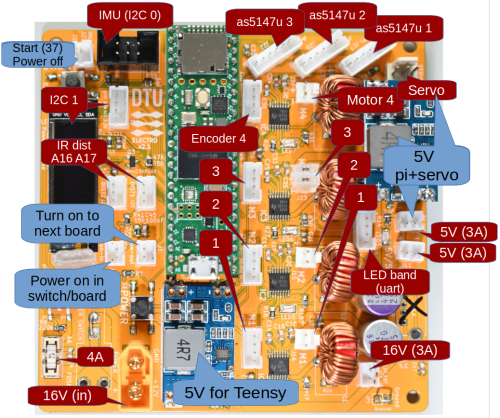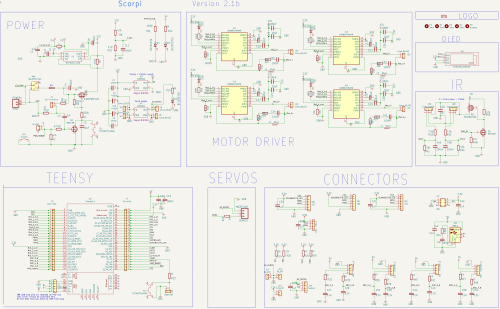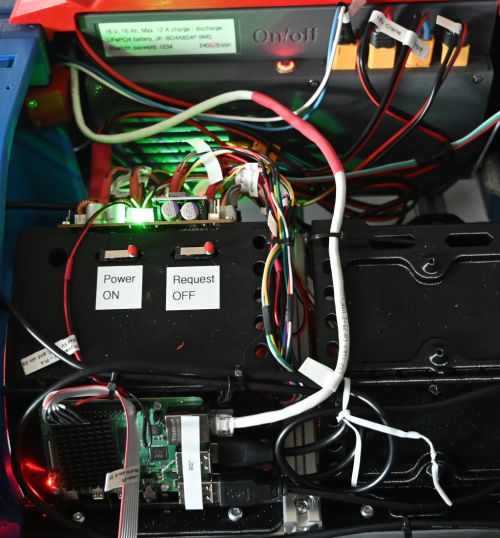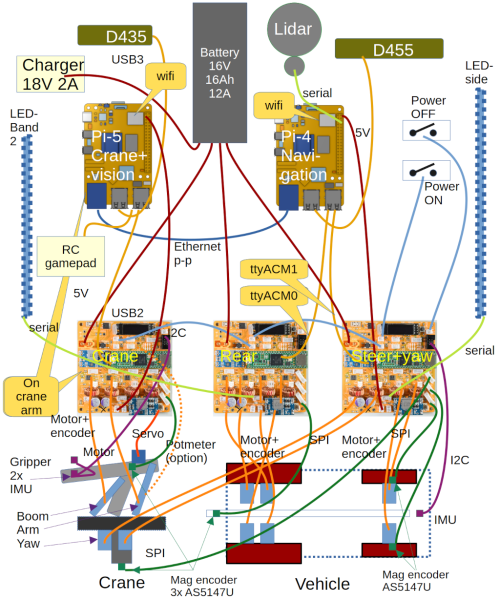Motor drive PCB: Difference between revisions
No edit summary |
No edit summary |
||
| (9 intermediate revisions by the same user not shown) | |||
| Line 4: | Line 4: | ||
[[File:motor_drive_PCB-top-ann.png | 500px]] | [[File:motor_drive_PCB-top-ann.png | 500px]] | ||
Figure 1 | Figure 1. Pcb version 2.1 with plug usage. | ||
[[File:power-on-mod-new-ann.png | 500px | Teensy circuit version 2.1]] | [[File:power-on-mod-new-ann.png | 500px | Teensy circuit version 2.1]] | ||
Figure | Figure 2. Teensy circuit version 2.1 for four motor controls. Click to get a better resolution. | ||
=== Power on === | === Power on === | ||
Power on is | Power on is designed to use an external power-on switch. | ||
The external switch turns on one board; this board then turns on slave boards. | The external switch turns on one board; this board then turns on slave boards. | ||
The physical on-off switch on the Teensy board is shorted in on-position. | |||
=== Power off === | |||
Raspberry Pi initiates turn off, which orders Teensy (boards) to turn off after the Raspberry shutdown. | |||
A request power off button will tell the Raspberry that it is time to shut down. | |||
Do not use the battery's power-off feature except in emergencies (e.g., if the battery is totally flat or something is burning). | |||
=== Bonnet view === | |||
[[File:Scorpi-under-the-bonnet.jpg | 500px]] | |||
Figure 3. Power on and off. The on/off on the battery (top of image) is for emergency use only. | |||
== | The teensy PCB (green light) is for steering and crane-yaw. | ||
The Raspberry (at the bottom of image) is for the Lidar and the D455 3D camera. | |||
== Cabling == | |||
This is the main cabling overview. | |||
[[file:scorpi-wirering.png | 500px]] | |||
Overview of cable connections. | |||
Latest revision as of 11:51, 3 October 2024
Back to scorpi
Motor drive PCB version 1,.2
Figure 1. Pcb version 2.1 with plug usage.
Figure 2. Teensy circuit version 2.1 for four motor controls. Click to get a better resolution.
Power on
Power on is designed to use an external power-on switch. The external switch turns on one board; this board then turns on slave boards.
The physical on-off switch on the Teensy board is shorted in on-position.
Power off
Raspberry Pi initiates turn off, which orders Teensy (boards) to turn off after the Raspberry shutdown. A request power off button will tell the Raspberry that it is time to shut down.
Do not use the battery's power-off feature except in emergencies (e.g., if the battery is totally flat or something is burning).
Bonnet view
Figure 3. Power on and off. The on/off on the battery (top of image) is for emergency use only.
The teensy PCB (green light) is for steering and crane-yaw.
The Raspberry (at the bottom of image) is for the Lidar and the D455 3D camera.
Cabling
This is the main cabling overview.
Overview of cable connections.



